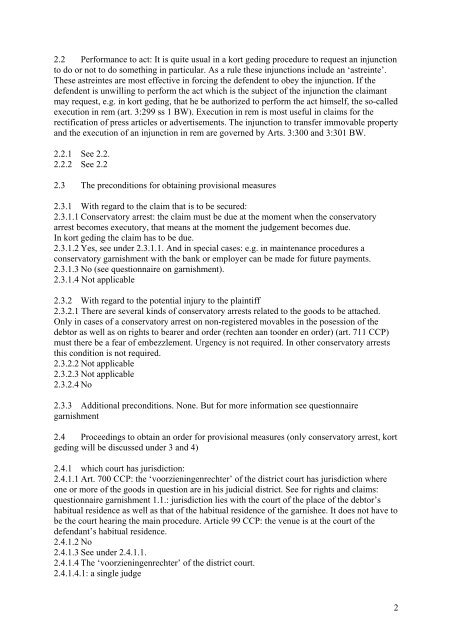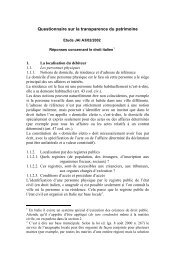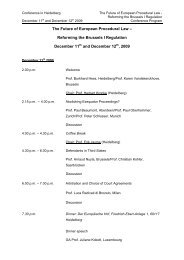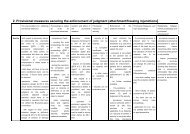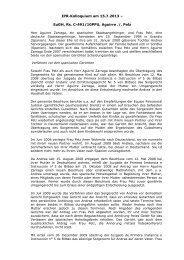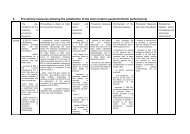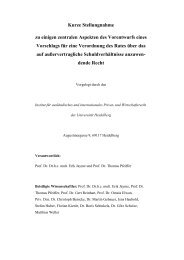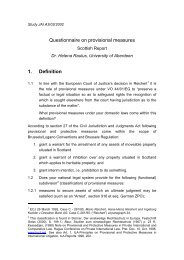1 Study JAI A3/02/2002 The Netherlands: Dr. Mirjam Freudenthal ...
1 Study JAI A3/02/2002 The Netherlands: Dr. Mirjam Freudenthal ...
1 Study JAI A3/02/2002 The Netherlands: Dr. Mirjam Freudenthal ...
You also want an ePaper? Increase the reach of your titles
YUMPU automatically turns print PDFs into web optimized ePapers that Google loves.
2.2 Performance to act: It is quite usual in a kort geding procedure to request an injunction<br />
to do or not to do something in particular. As a rule these injunctions include an ‘astreinte’.<br />
<strong>The</strong>se astreintes are most effective in forcing the defendent to obey the injunction. If the<br />
defendent is unwilling to perform the act which is the subject of the injunction the claimant<br />
may request, e.g. in kort geding, that he be authorized to perform the act himself, the so-called<br />
execution in rem (art. 3:299 ss 1 BW). Execution in rem is most useful in claims for the<br />
rectification of press articles or advertisements. <strong>The</strong> injunction to transfer immovable property<br />
and the execution of an injunction in rem are governed by Arts. 3:300 and 3:301 BW.<br />
2.2.1 See 2.2.<br />
2.2.2 See 2.2<br />
2.3 <strong>The</strong> preconditions for obtaining provisional measures<br />
2.3.1 With regard to the claim that is to be secured:<br />
2.3.1.1 Conservatory arrest: the claim must be due at the moment when the conservatory<br />
arrest becomes executory, that means at the moment the judgement becomes due.<br />
In kort geding the claim has to be due.<br />
2.3.1.2 Yes, see under 2.3.1.1. And in special cases: e.g. in maintenance procedures a<br />
conservatory garnishment with the bank or employer can be made for future payments.<br />
2.3.1.3 No (see questionnaire on garnishment).<br />
2.3.1.4 Not applicable<br />
2.3.2 With regard to the potential injury to the plaintiff<br />
2.3.2.1 <strong>The</strong>re are several kinds of conservatory arrests related to the goods to be attached.<br />
Only in cases of a conservatory arrest on non-registered movables in the posession of the<br />
debtor as well as on rights to bearer and order (rechten aan toonder en order) (art. 711 CCP)<br />
must there be a fear of embezzlement. Urgency is not required. In other conservatory arrests<br />
this condition is not required.<br />
2.3.2.2 Not applicable<br />
2.3.2.3 Not applicable<br />
2.3.2.4 No<br />
2.3.3 Additional preconditions. None. But for more information see questionnaire<br />
garnishment<br />
2.4 Proceedings to obtain an order for provisional measures (only conservatory arrest, kort<br />
geding will be discussed under 3 and 4)<br />
2.4.1 which court has jurisdiction:<br />
2.4.1.1 Art. 700 CCP: the ‘voorzieningenrechter’ of the district court has jurisdiction where<br />
one or more of the goods in question are in his judicial district. See for rights and claims:<br />
questionnaire garnishment 1.1.: jurisdiction lies with the court of the place of the debtor’s<br />
habitual residence as well as that of the habitual residence of the garnishee. It does not have to<br />
be the court hearing the main procedure. Article 99 CCP: the venue is at the court of the<br />
defendant’s habitual residence.<br />
2.4.1.2 No<br />
2.4.1.3 See under 2.4.1.1.<br />
2.4.1.4 <strong>The</strong> ‘voorzieningenrechter’ of the district court.<br />
2.4.1.4.1: a single judge<br />
2


